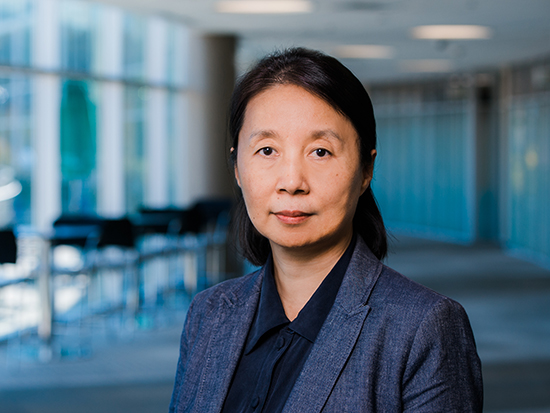Media contact: Anna Jones
 Yuhua Song, Ph.D.
Yuhua Song, Ph.D.
(Photography: Lexi Coon)More than 6 million Americans are living with Alzheimer’s disease, the leading cause of dementia worldwide, and nearly 95 percent of all cases are late-onset Alzheimer’s.
Yuhua Song, Ph.D., associate professor in the Department of Biomedical Engineering at the University of Alabama at Birmingham, has received a $2.1 million, five-year R01 grant from the National Institute on Aging to study a protein that may lead to viable treatment options for patients with Alzheimer’s disease.
Although much is unknown about the cause of Alzheimer’s, one of the key markers of this disease is inflammation in the brain that could potentially be caused by a protein called TREM2. Song and the team’s research surrounding TREM2’s role in Alzheimer’s could aid in the development of treatment plans for those with this disease.
“The approach in this study is unique in that we are integrating computational modeling, including unbiased virtual screening, with biophysical and biological experiments,” Song said. “This is multidisciplinary research with a team of researchers across several institutions that could impact the lives of so many struggling with Alzheimer’s.”
TREM2 plays a role in the development of the body’s natural immune response. Specific amino acid variants in TREM2 have been shown to be one of the strongest genetic risk factors for late-onset Alzheimer’s. However, TREM2’s function in Alzheimer’s is not yet fully understood.
Research outcomes from the study could aid in the development of novel therapeutic strategies, such as combined drug therapy, to enhance TREM2-mediated immune responses or compensate the loss of TREM2 function by Alzheimer’s-associated variants.
“We have this protein whose role in Alzheimer’s disease is unclear — but it has real implications,” said Hunter Dean, an M.D./Ph.D. graduate student in the Biomedical Engineering Graduate Program. “We keep finding TREM2 in different inflammatory diseases, but its role is still poorly understood.”
“This integrated computational and experimental approach that we’re taking for our study is powerful and hopefully can be used on other projects,” said Song, who is also collaborating with the Precision Medicine Institute and other groups on campus with her computational modeling work.
Song’s interdisciplinary team includes Erik Roberson, M.D., Ph.D., Rebecca Gale Endowed Professor, UAB Departments of Neurology and Neurobiology, and director of Alzheimer’s Disease Center (co-investigator); Jeremy Day, Ph.D., associate professor, UAB Department of Neurobiology; Thomas Brett, Ph.D., associate professor of Medicine, Cell Biology and Physiology, and Biochemistry and Molecular Biophysics at Washington University in St. Louis, Missouri (co-investigator); Li Gan, Ph.D., director, Helen and Robert Appel Alzheimer’s Disease Research Institute, and the Burton P. and Judith B. Resnick Distinguished Professor in Neurodegenerative Diseases at Weill Cornell Medicine; and Hunter Dean, an M.D./Ph.D. graduate student with Ph.D. study in the UAB Biomedical Engineering Graduate Program, who is jointly mentored by Song and Roberson.
“We started this project in 2018 when Hunter approached both Dr. Roberson, a physician-scientist with expertise in Alzheimer’s disease, and me, with expertise in integrated computational and experimental studies, and wanted to pursue his Ph.D. study with our joint mentorship,” Song said. “Since then, the team has continued to grow as we worked to keep the project moving forward.”